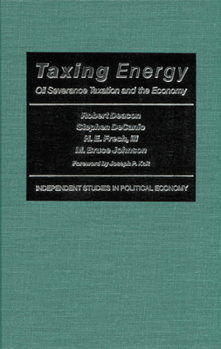Taxing Energy: Oil Severance Taxation and the Economy
Select Format
Select Condition 
Book Overview
Severance taxes--taxes levied upon the production of oil and natural gas--have long been popular with state governments. Such taxes are thought to have minimal impact upon the areas where petroleum wells are located, the costs of such taxes can be "exported" to a large and dispersed consumer base in other states, and an oil or gas well can not be moved to another state where taxes are lower. Because of these factors, severance taxes seem like "ideal" taxes for legislators to impose. But how do severance taxes work in the real world? Are they as really "painless" as they sound? Because of the immobility of the resource being taxed, do states tend to overtax? In this provocative study, the authors survey state severance taxes and find they tend to lower petroleum production, reduce jobs in the states imposing such taxes, and have negative effects that can ripple throughout a state's economy. Severance taxes look like "easy targets" for state governments. But as this book demonstrates--using thorough analysis--such taxes are often downright counterproductive and can actually reduce total state tax revenues.
Format:Library Binding
Language:English
ISBN:0945999690
ISBN13:9780945999690
Release Date:January 1990
Publisher:Independent Institute
Length:161 Pages
Weight:1.01 lbs.
Dimensions:0.7" x 6.4" x 9.2"
Customer Reviews
0 rating





